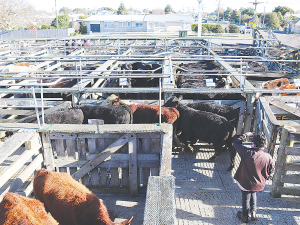The latest beef market report by Rabobank shows a trend that will be of concern to NZ cattle farmers.
Lead author of the report, senior animal protein analyst Angus Gidley- Baird, says Fonterra’s drop in the predicted farm gate milk price is likely to see an increase in dairy cow culling. He says the number of cows processed in the second quarter of 2023 is up 4.8% compared to last year. On top of this, Fonterra has mandated that all calves must enter a value stream from this season onwards.
“This could result in several hundred thousand additional calves being sent to processors within a six-week window that is already stretched.”
Gidley-Baird says although much of the heat has come off the global beef market and returns have eased considerably, NZ beef export volumes in the second quarter of 2023 increased 14% year-on-year. He says this increase has been underpinned by a 7% lift in beef production year-on- year.
While volumes are higher, weaker economic settings in China have negatively impacted prices and export earnings were back 13% year-on- year for the quarter.
“Export volumes to Japan have also been impacted by softer demand, with volumes back 49 per cent year-on-year for quarter two,” he adds.
The report also points out that increasing volumes of Australian beef exports are creating competition for NZ beef in the global market, which has led to North Island bull prices dropping 4% in July. However, it adds the slowing of the US cow kill is expected to lead to a reduction in US-produced lean trimmings, which in turn is expected to provide price support for the global lean trimmings market.
Global Issues
In terms of the global market, Gidley-Baird says beef markets around the world, other than the USA, are seeing a softening of consumer demand.
He says declining supply and strong consumer demand in the US is driving cattle prices higher, while lower domestic beef supply has also held up beef prices in Canada and Europe. But Angus Gidley-Baird says in most other regions the opposite applies, with increased supply and lower demand that is making prices softer.
US cattle prices have increased almost 30% over the last 12 months, whereas Australian cattle prices have dropped by more than 30%.
“This price split is the largest we have seen in the past 10 years,” he says. “Such a separation in prices will have consequences for beef exporters’ competitiveness and we expect to see some shift in trade volumes as a result.”
Gidley-Baird adds that – other than the US – there is softer consumer demand and full supply chains. In a number of regions, particularly in Asian countries, beef purchases made through 2022 and into 2023 in anticipation of recovery from Covid have not been consumed.
“These are now part of growing stock levels that also include other proteins,” he explains. “Softer consumer demand is making it harder to move these volumes through the system.”



















